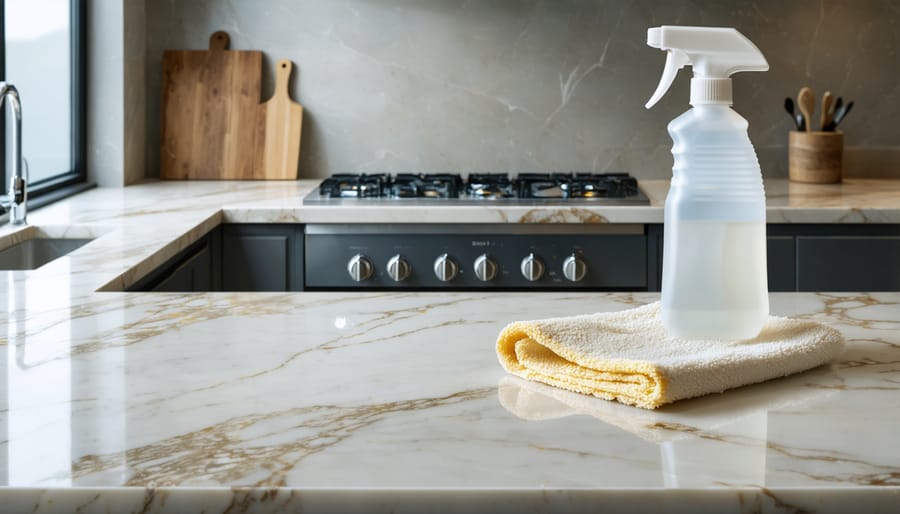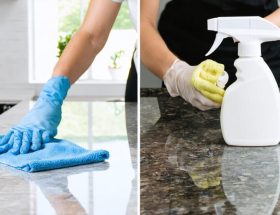Protect your quartz countertop’s pristine appearance with the right cleaning products and techniques that prevent damage while maintaining its natural luster. Modern quartz surfaces demand specific care – harsh chemicals and abrasive cleaners can permanently compromise their engineered finish, while the wrong cleaning routine risks dulling their signature shine. Professional-grade pH-neutral cleaners, specifically formulated for quartz, deliver superior results compared to all-purpose alternatives, effectively removing daily grime without etching or discoloring the surface. Whether dealing with stubborn stains, everyday spills, or routine maintenance, selecting the appropriate cleaning products ensures your investment remains beautiful and durable for years to come. This guide examines the most effective quartz-safe cleaning solutions available today, from specialized stone cleaners to gentle everyday options that protect your countertop’s engineered brilliance.
Why Quartz Countertops Need Special Care
Understanding Quartz Surface Properties
Engineered quartz countertops consist of approximately 93% natural quartz crystals combined with polymer resins and pigments. These quartz surface properties create a non-porous material that’s highly resistant to stains, scratches, and bacterial growth. Unlike natural stone, quartz doesn’t require sealing and maintains its durability with minimal maintenance.
However, this doesn’t mean quartz is indestructible. The resin binders can react negatively to harsh chemicals and extreme heat. Understanding these characteristics is crucial for selecting appropriate cleaning products. While quartz resists most common household stains, it’s essential to avoid abrasive cleaners, bleach, and highly alkaline or acidic solutions that could compromise the surface’s integrity. Regular cleaning with pH-neutral products is typically sufficient to maintain the material’s natural luster and protective properties.
Common Cleaning Mistakes to Avoid
Avoid using vinegar, lemon juice, or other acidic cleaners on your quartz countertops, as these can gradually erode the resin binding and dull the surface. Steel wool, scouring pads, and abrasive cleaners should never be used, as they can scratch and permanently damage the finish. Many homeowners mistakenly use bleach or harsh chemical cleaners, which can break down the surface sealant and cause discoloration.
High-heat items should never be placed directly on quartz surfaces, as thermal shock can cause cracking. Another common mistake is using generic glass cleaners, which often contain ammonia that can leave behind a filmy residue. Always clean spills immediately rather than letting them sit, as some substances can penetrate the surface if left too long.
Avoid excessive water when cleaning, as pooling liquid can potentially seep into seams. Instead, use a damp cloth and dry the surface thoroughly after cleaning. Remember that while quartz is highly durable, it’s not indestructible – treating it with appropriate care ensures its longevity.
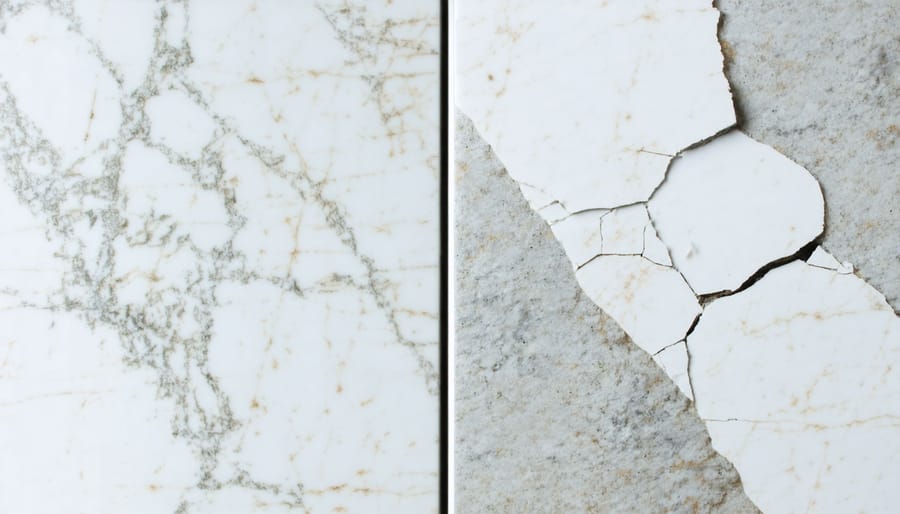
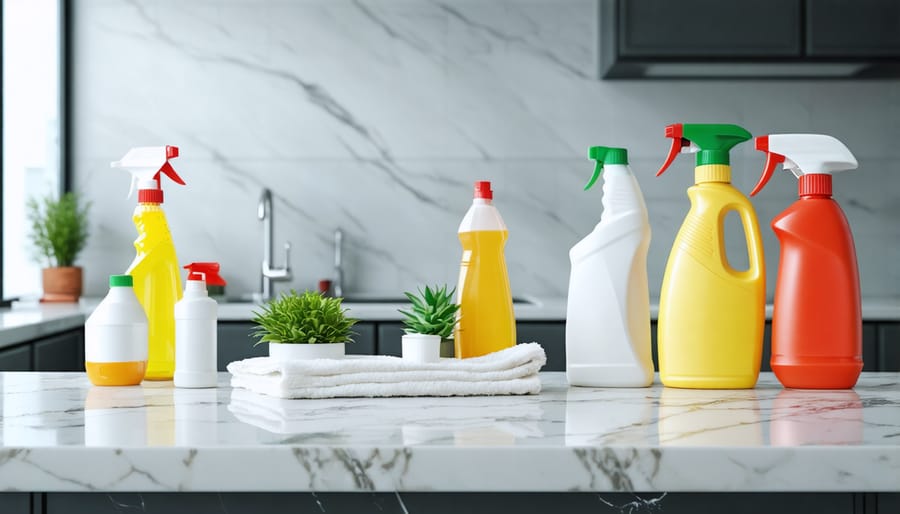
Best Commercial Cleaning Products for Quartz
Daily Cleaning Solutions
For daily maintenance of quartz countertops, mild dish soap and warm water remain the most reliable cleaning solution. Simply mix a few drops of gentle dish soap with warm water, and use a soft microfiber cloth to wipe down your surfaces. This combination effectively removes everyday dirt, food residue, and light stains without risking damage to your quartz.
Many manufacturers have developed specialized daily cleaners specifically formulated for quartz surfaces. These products are pH-neutral and contain no harsh chemicals that could potentially damage or dull the stone’s finish. Look for cleaners labeled “quartz-safe” or those explicitly recommended by your countertop’s manufacturer.
Glass cleaners can also serve as effective daily cleaning solutions, provided they’re ammonia-free. These products leave a streak-free finish and help maintain the natural shine of your quartz surfaces. However, always test new products on a small, inconspicuous area first.
For quick cleanup of spills and light messes, pre-moistened stone wipes offer convenience without compromising cleaning quality. These wipes are specially formulated to clean and protect quartz surfaces while being gentle enough for daily use.
Remember to avoid abrasive cleaners, bleach-based products, or anything highly acidic, as these can damage your quartz’s protective seal and diminish its natural luster over time. Stick to gentle, non-abrasive solutions for the best long-term results.
Deep Cleaning Products
For those stubborn stains and periodic maintenance needs, several specialized deep cleaning products are designed specifically for quartz surfaces. Stone cleaners like Weiman Quartz Intensive Cleaner and Rock Doctor Deep Clean Spray are formulated to tackle hardened residue without damaging the surface’s finish. These products excel at removing tough stains like dried-on food, hard water deposits, and adhesive residue.
Bar Keepers Friend Soft Cleanser provides an effective yet gentle abrasive action that’s safe for quartz, while Method Heavy-Duty Degreaser helps break down accumulated oils and cooking residue. For professional-grade cleaning, products like StoneTech Professional Deep Cleaner penetrate deep into the surface to lift embedded dirt and grime.
When using these intensive cleaners, always follow the manufacturer’s instructions carefully. Apply the product to a small, inconspicuous area first to ensure compatibility. Most deep cleaning solutions should be left to dwell on the surface for 5-10 minutes before wiping clean with a non-abrasive cloth or sponge. After deep cleaning, rinse thoroughly with clean water and dry the surface completely to prevent water spots.
Remember that while these products are effective, they should only be used occasionally for deep cleaning sessions, not as part of daily maintenance. Regular use of harsh cleaners can potentially dull the surface’s natural shine over time.
Specialty Cleaners for Specific Issues
While general-purpose quartz cleaners handle most daily cleaning needs, certain stubborn issues require specialized solutions. For tough hard water spots and mineral deposits, products like Stone Care International Hard Water Stain Remover and Weiman Hard Water Stain Remover are specifically formulated to dissolve these challenging deposits without damaging the quartz surface.
When dealing with adhesive residue from labels or tape, dedicated adhesive removers like Goo Gone Professional or 3M Adhesive Remover are effective choices. These products break down sticky residues while being gentle on the quartz material. However, always test these products on a small, inconspicuous area first.
For particularly tough stains or discoloration, specialized quartz stain removers like Granite Gold Stain Remover or Supreme Surface Stone Stain Remover offer targeted solutions. These products are designed to lift deep-set stains while maintaining the integrity of your quartz surface.
Oil-based stains may require specific oil-lifting cleaners such as Oil Stain Remover by Tenax or Stone Pro’s Oil Stain Remover. These products use advanced formulations to draw out oil from the micro-pores of the surface without causing etching or dulling.
Remember that while these specialty cleaners are effective, they should only be used when necessary and according to manufacturer instructions to maintain your quartz warranty and preserve the surface’s appearance.
DIY Cleaning Solutions
While commercial cleaners are effective, you can create equally powerful cleaning solutions for your quartz countertops using common household ingredients. These DIY alternatives are not only cost-effective but also environmentally friendly and safe for your family.
The most basic and reliable homemade solution consists of warm water and mild dish soap. Mix a few drops of dish soap with warm water in a spray bottle, and you’ll have an excellent daily cleaner that removes most surface dirt and spills without damaging your quartz.
For tougher stains, create a paste using baking soda and water. Apply this gentle abrasive mixture to the stain, let it sit for a few minutes, then wipe clean with a soft, damp cloth. This method is particularly effective for removing dried food particles or light surface marks.
White vinegar, diluted with equal parts water, serves as an excellent natural disinfectant. However, use this solution sparingly and always dilute properly, as concentrated acidic solutions can potentially dull your quartz’s finish over time.
For stubborn dried spills, a mixture of 1/4 cup rubbing alcohol and 2 cups water creates an effective cleaning solution that helps break down resistant residue without damaging the surface. This solution is also excellent for achieving a streak-free shine.
Important precautions when using DIY solutions:
– Never use undiluted vinegar or lemon juice
– Avoid bleach-based mixtures
– Test new solutions on a small, inconspicuous area first
– Always use soft, non-abrasive cloths for application
– Rinse thoroughly with clean water after cleaning
– Dry the surface completely to prevent water spots
These homemade solutions can be just as effective as commercial products when used correctly, maintaining your quartz countertops’ beauty while saving money and reducing chemical exposure in your home.
Application Techniques and Best Practices
Step-by-Step Cleaning Process
Begin by gathering your cleaning supplies: a non-abrasive cleaner specifically formulated for quartz, a soft microfiber cloth, and warm water. Remove any loose debris or crumbs from the surface with a dry cloth or paper towel.
Spray the quartz cleaner evenly across the surface, working in manageable sections of about 2-3 feet at a time. If using a concentrated cleaner, dilute according to the manufacturer’s instructions. For daily cleaning, warm water and mild dish soap can suffice.
Using gentle, circular motions, wipe the surface with your microfiber cloth. Avoid applying excessive pressure, as this isn’t necessary with quartz. Pay special attention to any spots with dried-on spills or stubborn stains, allowing the cleaner to sit for 30-60 seconds before wiping.
Once you’ve cleaned the entire surface, use a separate clean, damp microfiber cloth to remove any remaining cleaning solution. This prevents streaking and residue buildup. Finally, dry the countertop thoroughly with a fresh microfiber cloth to achieve a streak-free shine.
For tough stains, never use abrasive scrubbers or harsh chemicals. Instead, use a plastic scraper to gently lift the residue, then clean as normal. Remember to always clean spills immediately to prevent potential staining or damage to your quartz surface.
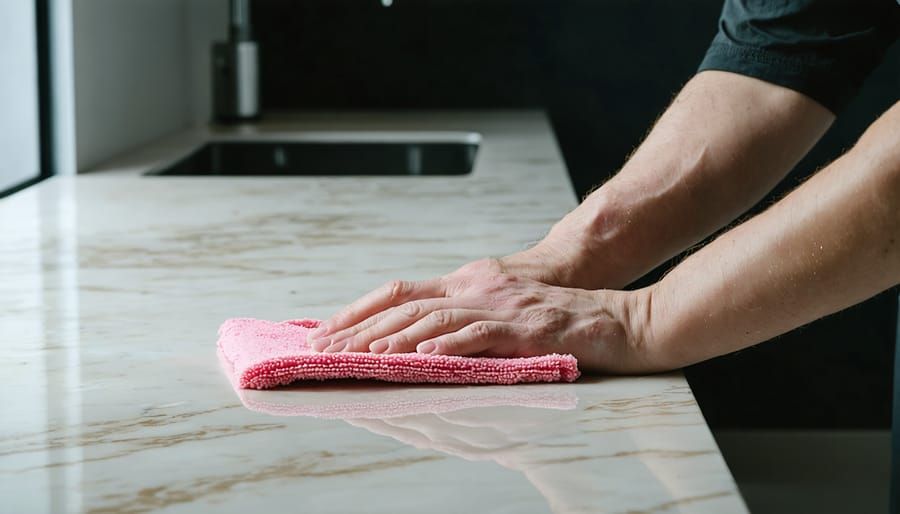
Maintenance Schedule Tips
For optimal long-term quartz maintenance, establish a consistent cleaning schedule. Daily wiping with a soft microfiber cloth and warm water removes surface debris and prevents buildup. For deeper cleaning, use a pH-neutral cleaner specifically formulated for quartz once or twice weekly, depending on usage intensity.
Monthly maintenance should include a thorough inspection for any stains or damage, followed by a deep clean using approved quartz cleaners. Pay special attention to high-traffic areas and spots near cooking zones where spills are common.
Quarterly maintenance calls for evaluating seams and edges for any signs of wear or separation. While quartz is highly durable, professional assessment every 12-18 months helps identify potential issues before they become problematic.
Remember to clean spills immediately, especially from acidic substances like wine, citrus, or tomato-based products. Use cutting boards and hot pads consistently to prevent surface damage, and avoid placing hot cookware directly on the countertop. These simple habits significantly extend the life and beauty of your quartz surfaces.
Selecting the right cleaning products for your quartz countertops is crucial for maintaining their beauty and durability for years to come. Throughout this guide, we’ve explored various cleaning solutions, from pH-neutral cleaners to specialized quartz products, and discussed the importance of avoiding harsh chemicals that could damage your investment.
Remember that while quartz is highly durable, it’s not indestructible. Using the wrong cleaning products can dull the surface, compromise its seal, or even cause permanent damage. By sticking to manufacturer-recommended cleaners and following proper cleaning techniques, you’ll preserve your countertop’s lustrous appearance and protect its antimicrobial properties.
For daily cleaning, a mild dish soap and warm water solution remains your safest bet. For deeper cleaning needs, choose products specifically formulated for quartz surfaces. Always test new products on a small, inconspicuous area first, and keep a consistent cleaning routine to prevent buildup and staining.
By investing in the right cleaning products and maintaining proper care practices, your quartz countertops will continue to be a stunning centerpiece in your space for decades to come.

